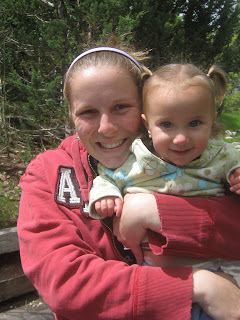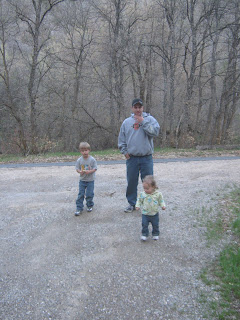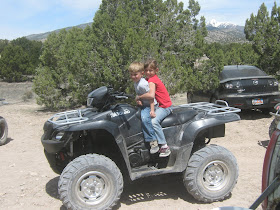Well, it's official! Ryker's Rykeriness is explained! I talk a lot on here and everywhere about how Ryker is destructive and clumsy and rough with everything. It always seemed so weird that he would be so persistent with hurting things and breaking things that people cared about when he's inherently such a sweet and loving boy. I couldn't understand why I was needing to instruct him on things like getting off the yelping dog's head or stop breaking apart Raelin's tower as she's crying and pleading with him to stop. Or why he kept crashing out of his chair into a crumpled heap on the floor. I couldn't understand why, despite YEARS of consistent coaching and disciplining, he was STILL hitting things/people with sticks and throwing rocks. And why was pain, God's natural teacher, not having the normal impact on him? He just never seems to learn from pain. I give him a hug and he's right back at it, no more careful or wary than he was before; no change in behavior at all. And it seemed odd that at almost 5 years old, he's still taking a 2-3 hour nap daily. There are also lots of days where I have to say, "Okay, Ryker, just STOP MOVING!" because the amount of motion going on when I'm trying to accomplish something is dizzying! Lots of these things independently could be chalked up to him just being a boy or being 4 years old, but when you put it all together, there just seemed to be something "off." I finally ran into a friend about three weeks ago who mentioned a few things about her boys that raised a red flag for me and I started asking questions. She pointed me in the direction of Sensory Processing Disorder and a book called The Out of Sync Child. I read it and it explained EVERYTHING I've always felt was "off" about my son. I got in touch with the right people at Ryker's school and they had someone come out to observe him for a day. She saw lots of SPD symptoms and referred us to an occupational therapist (who is a SPD specialist and is GREAT). We had an assessment today and it went great! I'm learning a lot and we are gaining a lot of understanding about Ryker; about why he has been so hard to handle in certain regards (especially when he's tired). And we're learning what we can do to make all our lives easier. Ah! It's so nice to have answers! And to feel like the ways in which he's difficult aren't my fault or his!
For those of you interested in what SPD is, basically it means that the brain misinterprets normal sensory information (touch, sound, movement). There are several types of this. Some people are over-responsive, feeling bombarded by sensory information (not Ryker). They feel hyper-stimulated by the feeling of their clothes, wind, light, noise, etc. They end up seeming fearful of experiences most of us don't bat an eye at. Others (Ryker) seek out intense sensory experiences. They stomp, bang, crash, hit, etc. This is Ryker in a nutshell. Others have difficulty with motor skills, like writing, kicking a ball, imitating movements, balance, etc.
So Ryker's main area of difficulty is with the sense called proprioception. His brain doesn't process correctly where he is in space, so he bumps into things and bangs things and hits and throws so that he can get a sense for where he IS. If he crashes into the table, well, now he knows where his body is. If he hits something with a stick, he can figure out where his arms are. So he's constantly seeking out deep, heavy input to learn where he is and what his body is doing. The solution is to offer outlets for these things (opportunities to hammer and to stomp and to hit APPROPRIATE things) so that he can have those input needs met and therefore become more regulated. Over time, he will learn to function in a normal range instead of a hypo-sensitive range. Regular input will start to be enough for his brain to process and formulate a more appropriate response (for instance, a few weeks ago, he sat on Zuma's head. She started yelping, but because of the way his brain misinterprets senses, he didn't process that HIS behavior was causing her pain and that the appropriate response is to GET OFF! So if we help him learn to regulate himself, he will start to process things the right way and formulate the correct responses).
I have a lot more reading and learning to do before I feel like I really have a handle on this whole thing, but that's the long and the short of what I've learned so far. I also have a lot of reading and learning to do before I feel equipped with enough ideas and tools to be able to redirect his behavior appropriately. But for now, we are going to try encouraging pillow fights (Raelin gets to start it whenever he's being antagonistic or ruining her games), wheelbarrow races, building specific things (not just arbitrarily hammering nails), pushing and pulling heavy things, playing catch with different sized balls, etc. These will all help to meet his needs for sensory input and create for him a "sensory diet." On the other end of the spectrum, to help Ryker calm down, the OT suggested a swing in his room (wouldn't every kid LOVE to have that sort of prescription!) and a short yoga routine. So, here we go! I hope we get some good results from all these ideas! I'll certainly keep you posted about how Ryker progresses over time.
For those of you interested in what SPD is, basically it means that the brain misinterprets normal sensory information (touch, sound, movement). There are several types of this. Some people are over-responsive, feeling bombarded by sensory information (not Ryker). They feel hyper-stimulated by the feeling of their clothes, wind, light, noise, etc. They end up seeming fearful of experiences most of us don't bat an eye at. Others (Ryker) seek out intense sensory experiences. They stomp, bang, crash, hit, etc. This is Ryker in a nutshell. Others have difficulty with motor skills, like writing, kicking a ball, imitating movements, balance, etc.
So Ryker's main area of difficulty is with the sense called proprioception. His brain doesn't process correctly where he is in space, so he bumps into things and bangs things and hits and throws so that he can get a sense for where he IS. If he crashes into the table, well, now he knows where his body is. If he hits something with a stick, he can figure out where his arms are. So he's constantly seeking out deep, heavy input to learn where he is and what his body is doing. The solution is to offer outlets for these things (opportunities to hammer and to stomp and to hit APPROPRIATE things) so that he can have those input needs met and therefore become more regulated. Over time, he will learn to function in a normal range instead of a hypo-sensitive range. Regular input will start to be enough for his brain to process and formulate a more appropriate response (for instance, a few weeks ago, he sat on Zuma's head. She started yelping, but because of the way his brain misinterprets senses, he didn't process that HIS behavior was causing her pain and that the appropriate response is to GET OFF! So if we help him learn to regulate himself, he will start to process things the right way and formulate the correct responses).
I have a lot more reading and learning to do before I feel like I really have a handle on this whole thing, but that's the long and the short of what I've learned so far. I also have a lot of reading and learning to do before I feel equipped with enough ideas and tools to be able to redirect his behavior appropriately. But for now, we are going to try encouraging pillow fights (Raelin gets to start it whenever he's being antagonistic or ruining her games), wheelbarrow races, building specific things (not just arbitrarily hammering nails), pushing and pulling heavy things, playing catch with different sized balls, etc. These will all help to meet his needs for sensory input and create for him a "sensory diet." On the other end of the spectrum, to help Ryker calm down, the OT suggested a swing in his room (wouldn't every kid LOVE to have that sort of prescription!) and a short yoga routine. So, here we go! I hope we get some good results from all these ideas! I'll certainly keep you posted about how Ryker progresses over time.




















































